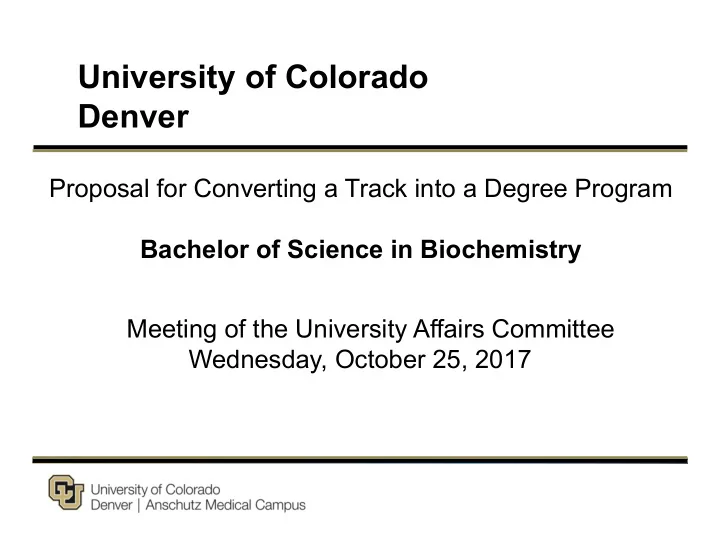

University of Colorado Denver Proposal for Converting a Track into a Degree Program Bachelor of Science in Biochemistry Meeting of the University Affairs Committee Wednesday, October 25, 2017
Overview of Biochemistry Progr am • Since 2012 has existed as a track in the BS in Chemistry program • Enrollments have steadily increased such that approximately 1/3 of students in the degree are enrolled in the Biochemistry track • Creating a separate degree will likely expand its enrollment by increasing its visibility and accessibility to prospective students • Can be implemented without any new courses
Further Discussion: • Workforce Demand • Student Demand • Enrollment • Duplication • Budget
Workforce Demand • Strong local demand for graduates in Biochemistry fueled by the expanding biotechnology and pharmaceutical industries and higher education institutions in the Colorado front range
Student Demand • One-third of students in the BS in Biochemistry are enrolled in the Biochemistry track • Biochemistry is popular for students: • preparing for a career in health sciences • interested in graduate programs in biomedical research • seeking employment in the biotech and pharmaceutical industries
Enrollment 2019-20 Year 2018-19 2020-21 2021-22 2022-23 37 Headcount 19 45 49 49 10 Graduates 0 13 17 17
Duplication • Bachelor’s degrees in Biochemistry are offered at CU- Boulder (BA) and UCCS (BA and BS) • The CU Denver program will focus on molecular medicine, including undergraduate research opportunities on the Anschutz Medical campus
Year 1 Year 2 Year 3 Year 4 Year 5 Full Implement 2018‐19 2019‐20 2020‐21 2021‐22 2022‐23 Program Year Program FTE 3.7 9.8 12.8 14.4 15.7 15.7 Projected Revenues Cash Revenue: Tuition $70,113 $252,402 $309,399 $336,183 $365,738 $365,738 Cash Revenue: Fees $2,431 $6,351 $8,200 $9,410 $10,528 $10,528 Other Revenue $0 $0 $0 $0 $0 $0 Federal Grants/Donation $0 $0 $0 $0 $0 $0 Other Fund Sources $5,000 $5,000 $5,000 $5,000 $5,000 $5,000 Institutional Reallocation $12,248 $24,496 $36,744 $36,744 $36,744 $36,744 Total Program Revenue $89,792 $288,249 $359,343 $387,337 $418,010 $418,010 Projected Expenses Faculty (New Courses) $12,000 $27,975 $32,630 $32,630 $37,285 $37,285 Financial Aid specific to program $5,000 $18,000 $37,500 $37,500 $37,500 $37,500 Instructional Materials $1,000 $1,000 $1,000 $1,000 $1,000 $1,000 Program Administration $32,319 $75,544 $75,544 $89,908 $89,908 $89,908 Net of Campus/School Overhead $32,603 $106,241 $127,073 $137,242 $148,057 $148,057 Rent/Lease $0 $0 $0 $0 $0 $0 Other Operating (TAs) $17,679 $30,847 $44,944 $46,154 $47,272 $47,272 Total Operating Expenses $100,601 $259,607 $318,691 $344,434 $361,022 $361,022 Program Start‐Up Expenses Capital Construction $0 $0 $0 $0 $0 $0 $0 $0 $0 $0 $0 $0 Equipment Acquisitions $0 $0 $0 $0 $0 $0 Library Acquisitions Total Program Expenses $100,601 $259,607 $318,691 $344,434 $361,022 $361,022 Net Operating Balance ‐$10,809 $28,642 $40,652 $42,903 $56,988 $56,988
Budget Details • The start up costs for program development, coordination and marketing total $16,225 and will be covered by the CLAS • By full implementation, new tuition is estimated at $205,620 • With additional enrollment, new sections of existing courses will be added and taught by adjuncts (Cost $10,000) • Administrative costs: $11,305 is budgeted to offset a course buyout for the director (an existing faculty member) who will serve in several roles including: student advising, program development and program oversight.
Conclusion • The program currently exists as a popular track in the BS in Biochemistry • In addition to student demand for a BS in Biochemistry at CU Denver, there is also a workforce demand • Can be implemented with minimal additional costs
Recommend
More recommend